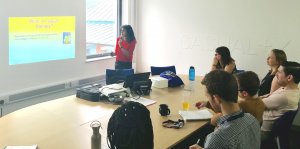26th February 2019
Maggots make their primetime TV debut thanks to Swansea University experts
Swansea University experts have been helping to secure a small-screen starring role for the humble medicinal maggot.
Saturday night’s episode of BBC primetime hospital drama Casualty saw the introduction of a collection of tiny new cast members.
The plot has been developed with assistance from Professor Yamni Nigam who heads the research team behind the Love a Maggot campaign.
She has been working with the production team of the Cardiff-based drama for more than six months, advising them on the power of the mighty medicinal maggot.
Saturday’s episode saw Dr Dylan Keogh becoming intrigued when he spots that maggots seem to be keeping a homeless man’s wound clean without the use of antibiotics.
Maggots have been used to clean wounds for centuries but the practice fell out of favour following the discovery of antibiotics in the 1940s.
However, with the spread of antimicrobial resistance standard treatments for some infections are becoming ineffective and this is becoming a global health challenge.

Professor Nigam said: “Since 2016 we’ve been working to raise awareness of how effectively maggots can help infected wounds– we are gradually spreading the word through our outreach events but to get our message included in such a flagship programme is just fantastic.”
She became involved thanks to her College of Human and Health Sciences colleague, senior lecturer Tom Hewes who also is a paramedic advisor to the programme.
In August 2018, she was invited to talk to the Casualty research and writing team and explained how medicinal maggots appear immune to antimicrobial resistance and can rid wounds of dead tissue and different species of bacteria in a matter of days.
Medicinal maggots are available on prescription from the NHS and can be used on a variety of wounds, from diabetic foot ulcers to burn wounds.
As well as eating away at the dead tissue, the Swansea University team has discovered key molecules in maggot secretions which kill bacteria and aid healing.
But Professor Nigam admits many people – often adults – don’t want to have living creatures near their wound.
“There is definitely a ‘yuck factor’ associated with maggots – but once a person gets over that and has access to information on what a medicinal maggot can do, they generally change their attitude.
“Despite being a bacteria-busting powerhouse, maggot therapy isn’t well known or popular in the UK or indeed elsewhere. Let’s hope Casualty can help us change that!”
Saturday’s episode is available on BBC iPlayer.
